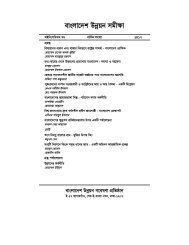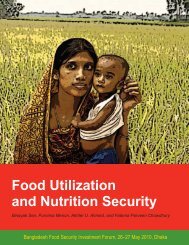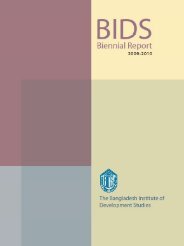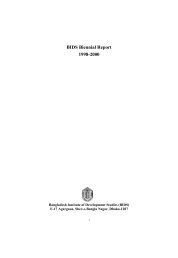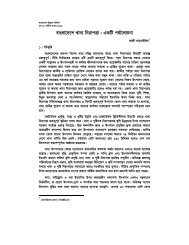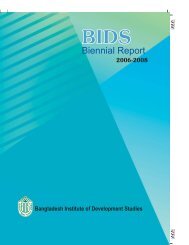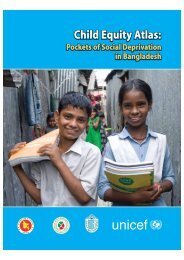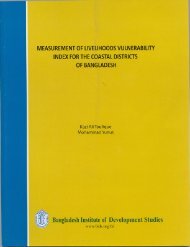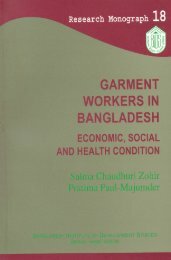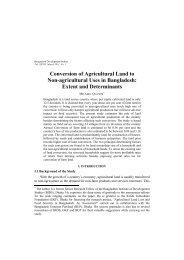INTEGRATED PROTECTED AREA CO-MANAGEMENT (IPAC) - BIDS
INTEGRATED PROTECTED AREA CO-MANAGEMENT (IPAC) - BIDS
INTEGRATED PROTECTED AREA CO-MANAGEMENT (IPAC) - BIDS
Create successful ePaper yourself
Turn your PDF publications into a flip-book with our unique Google optimized e-Paper software.
The foremost policy, therefore, will be to address the poverty of the bottom layer forest resource<br />
actors which will effectively help the management and conservation of the SRF. To sum up, as the<br />
Problem Analysis demonstrates, this demands a special attention because of the following:<br />
• The SRF collection quantity has significantly declined. Some of the species are getting<br />
rarer. This is more so in fishery sector 15 and that is why the fishery sector demands a<br />
special focus.<br />
• Number of harvesters (e.g., fishermen or golpata collectors) increased many fold (present<br />
study estimates over 0.9 million fish collectors, most of which are fisher laborers; other<br />
actors in the fish sector estimates as more than 0.2 million in this sector, most of whom<br />
are Farias/Beparis.<br />
• Because of gradual displacement from agriculture due to increased salinity more number<br />
of people are pouring into SIZ as collectors. Most SRF extractions are merely seasonal<br />
and consequently there is high pressure on the fishery sector for subsistence and per<br />
capita collection has been reduced to a large extent.<br />
• The major income share of the harvesters is taken away by the higher level intermediaries<br />
such as the Mahajans or the Aratdars due to dadons. Dadons and poverty operate in a<br />
vicious circle.<br />
• Transportation cost, especially for the fishers, is very high. And the time needed for the<br />
transportation/collection is also long to render the collectors more vulnerable.<br />
• One of the major extraction costs is due to ransom to the pirates, and unofficial payments<br />
to officials of various departments.<br />
Keeping the above in perspectives, some of the policy interventions are discussed below.<br />
Improving the Value Chains and Poverty Situations of SRF Actors<br />
Credit and Financial Support<br />
Access to capital has been the most crucial issue, especially among the collectors. Although<br />
dadon is a source of exploitation for the collectors hardly they are left with other choices. There<br />
are two major reasons for which they take dadons; (1) dadons are easily accessible and available<br />
in adequate amounts and (2) dadons provide immense support during lean periods. Dadons act<br />
as physical, social and financial safety.<br />
However, the bottom layer SRF actors such as harvesters and Farias are locked into contracts<br />
that perpetuate this cycle of debt. A pertinent question is how to break or whether to break the<br />
system. Nevertheless, as it is difficult to break the deep-rooted dadon system the positive and<br />
negative sides to this business need to be considered when planning new interventions geared at<br />
improving value chains.<br />
Access to Capital - Setting up of Specialized Banks and Specialized Programs<br />
Government should recognize Sundarbans Reserved Forest (SRF) as a separate and important<br />
economic sector, just as Agriculture or Industries, as SIZ consists of more than 9 million people.<br />
Specialized banks or specialized micro-credit organizations are to be set up to save the<br />
harvesters of the Sundarbans. Like agriculture loans, share cropper loans and SME loans<br />
programs some credit programs need to be lunched where SRF actors should be given a special<br />
attention. The central bank can take initiatives in this respect 16 .<br />
15 In fact, so far as BBS (Fisheries Statistical Yearbook of Bangladesh, 2007-08) is concerned, fish production<br />
has increased ( at the rate of 6.3% for SRF and 6.5% for the country as a whole, per year, based on data for<br />
1998-99 to 2007-08. But due to increased pressure on the fishery sector per capita catch has declined.<br />
16<br />
Only recently, the Central Bank launched several credit programs to support agriculture, in general, and<br />
share croppers in particular. A discussion of the author with the Bangladesh Bank Governor, who is very<br />
li



